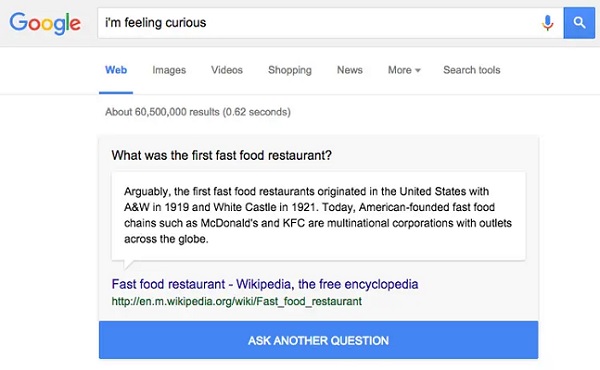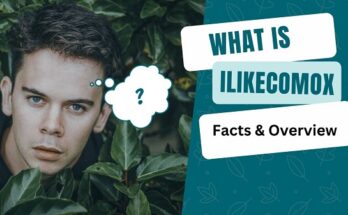In today’s information age, where answers to our questions are just a click away, we often take for granted the thrill of curiosity. “I’m Feeling Curious” is a phrase familiar to most internet users, particularly those who frequent the omnipotent search engine, Google. But what does it mean, and why is it essential in our quest for knowledge? Join us on a journey to explore the depths of curiosity and its impact on our lives.
The Origins of “I’m Feeling Curious”
Curiosity has always been a driving force behind human progress. From the moment our early ancestors wondered about the stars in the night sky to the present day, where we ponder the mysteries of the universe, curiosity has been our guiding light. The phrase “I’m Feeling Curious” itself originated from the idea that our thirst for knowledge is insatiable, and it’s an acknowledgment of our natural inclination to seek answers.
Google’s Role in Satisfying Curiosity
Google, the world’s leading search engine, has played a pivotal role in satisfying our curiosity. With billions of searches conducted daily, Google’s search bar has become the gateway to the vast realm of human knowledge. The “I’m Feeling Curious” feature, which offers users random facts and trivia, is a testament to Google’s commitment to quenching our thirst for knowledge.
The Mechanics Behind “I’m Feeling Curious”

But how does this feature work? When you type “I’m Feeling Curious” into the Google search bar, you’re presented with a random fact or piece of trivia. The results are often fascinating, ranging from historical events to scientific discoveries, and even peculiar facts about the animal kingdom. This randomness adds an element of surprise and excitement to the quest for knowledge.
Harnessing the Power of Random Knowledge
“I’m Feeling Curious” is not just about idle information. It’s about embracing the unexpected and, in doing so, broadening our horizons. You may start your search thinking about one topic and end up learning something entirely different. This random exploration of knowledge is a unique and enjoyable experience.
Must Read: What Is Amazons GPT44x: Everything You Show Now About It
Benefits of Feeding Curiosity
Curiosity is more than just a fleeting feeling; it’s a powerful force that drives innovation, creativity, and personal growth. When we nurture our curiosity, we become better problem solvers, critical thinkers, and more adaptable individuals. In essence, curiosity is the spark that ignites our intellectual pursuits.
The Science Behind Curiosity
The pursuit of knowledge is deeply rooted in our biology. Our brains are wired to seek information and solve problems, which is why curiosity often feels so rewarding. The release of dopamine, a pleasure-inducing neurotransmitter, when we find answers, motivates us to keep asking questions.
Curiosity in Everyday Life
Curiosity isn’t limited to scientific endeavors. It’s a part of our daily lives. Whether we’re exploring new cuisines, traveling to unfamiliar places, or delving into a gripping novel, curiosity enriches our experiences. It’s the driving force behind self-improvement and personal growth.
Curiosity’s Influence on Learning
In the realm of education, curiosity is a key factor in effective learning. When students are curious, they are more engaged and motivated to learn. Teachers who can tap into their students’ natural curiosity find that learning becomes a joyous adventure rather than a chore.
The Psychology of Curiosity
Psychologists have long been intrigued by curiosity. It’s a complex and multifaceted human trait. Curiosity can be triggered by novelty, uncertainty, or a desire for mastery. Understanding the psychology behind curiosity can help us harness its power more effectively.
I’m Feeling Curious: Curiosity and Problem Solving
Curiosity and problem-solving are closely intertwined. When we encounter challenges or puzzles, our curiosity compels us to find solutions. This problem-solving mindset is at the heart of technological advancements, scientific breakthroughs, and human progress.
Keeping the Spark of Curiosity Alive
As we grow older, our sense of wonder can sometimes fade. But it’s essential to keep the spark of curiosity alive. One way to do this is by embracing new experiences, seeking out new challenges, and continually asking questions. The more we feed our curiosity, the more it flourishes.
Must Visit: Soymamicoco: Revolution of Flavors and Health Benefits
How Curiosity Connects Us?
Curiosity is not a solitary endeavor. It’s a social catalyst that connects us with others. When we share our interests and discoveries, we create bonds and enrich our relationships. It’s a reminder that curiosity is not just about acquiring knowledge; it’s about building connections.
Curiosity in the Digital Age
The digital age has revolutionized the way we satisfy our curiosity. With the world’s information at our fingertips, we can explore any topic that piques our interest. However, this ease of access also comes with challenges, such as discerning reliable sources from misinformation.
The Future of Curiosity and Technology
In an ever-evolving technological landscape, the future of curiosity is promising. Artificial intelligence and machine learning are making it easier to access and organize information. Virtual reality and augmented reality offer new dimensions of immersive learning experiences. As technology continues to advance, so does our capacity to satisfy our innate curiosity.
Final Thoughts:
“I’m Feeling Curious” is more than just a random fact generator on Google; it’s a celebration of our innate curiosity. It’s a reminder that in a world overflowing with information, the thirst for knowledge still burns brightly within us. Curiosity is the driving force behind our quest to understand the world, and it’s a force that should be nurtured and celebrated. So, the next time you’re feeling curious, don’t hesitate to embrace it, for it may lead you to discoveries you never imagined.
FAQ’s About I’m Feeling Curious:
1. Is curiosity a learned trait, or are we born with it?
Curiosity is a combination of both innate and learned traits. We are born with a natural inclination to explore and seek answers, but our experiences and environment also shape our curiosity.
2. How can I cultivate curiosity in my daily life?
You can cultivate curiosity by embracing new experiences, asking questions, and seeking out opportunities to learn. Stay open-minded and explore subjects that pique your interest.
3. Can too much curiosity be a bad thing?
Excessive curiosity, like anything in excess, can be detrimental. It’s essential to strike a balance between satisfying your curiosity and maintaining a healthy life and relationships.
4. How can educators harness the power of curiosity in the classroom?
Educators can encourage curiosity by creating an environment that values questions and exploration. Incorporating interactive and engaging lessons also sparks students’ curiosity.
5. Are there any downsides to the abundance of information in the digital age?
While the digital age provides unprecedented access to information, it also poses challenges in terms of misinformation and data overload. It’s crucial to develop critical thinking skills to navigate this vast sea of knowledge.


